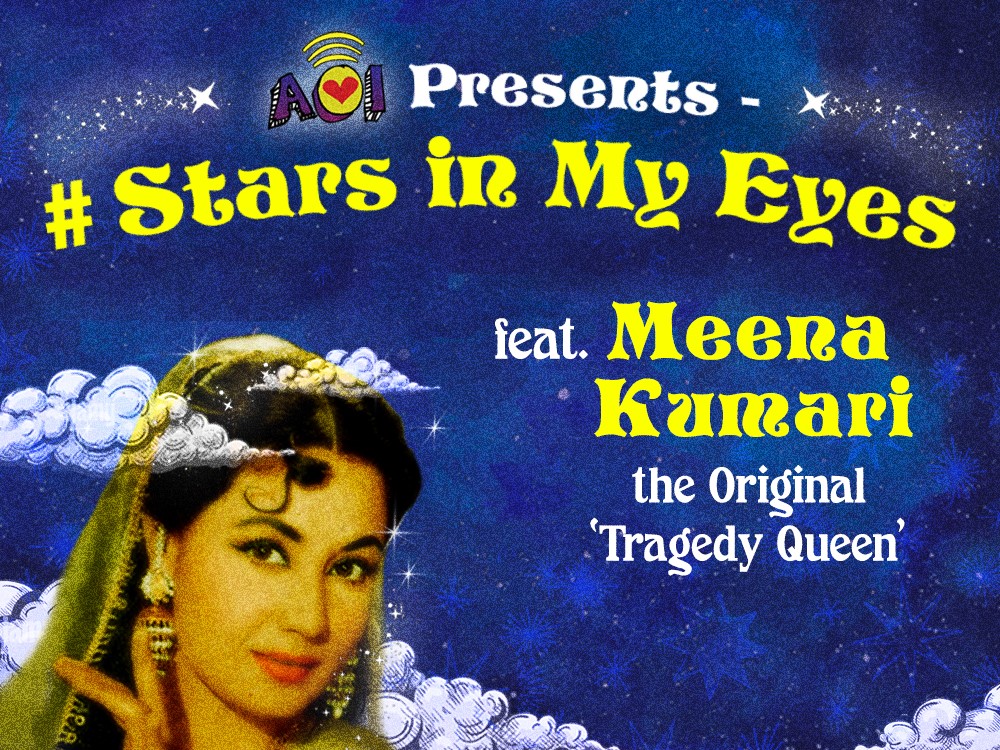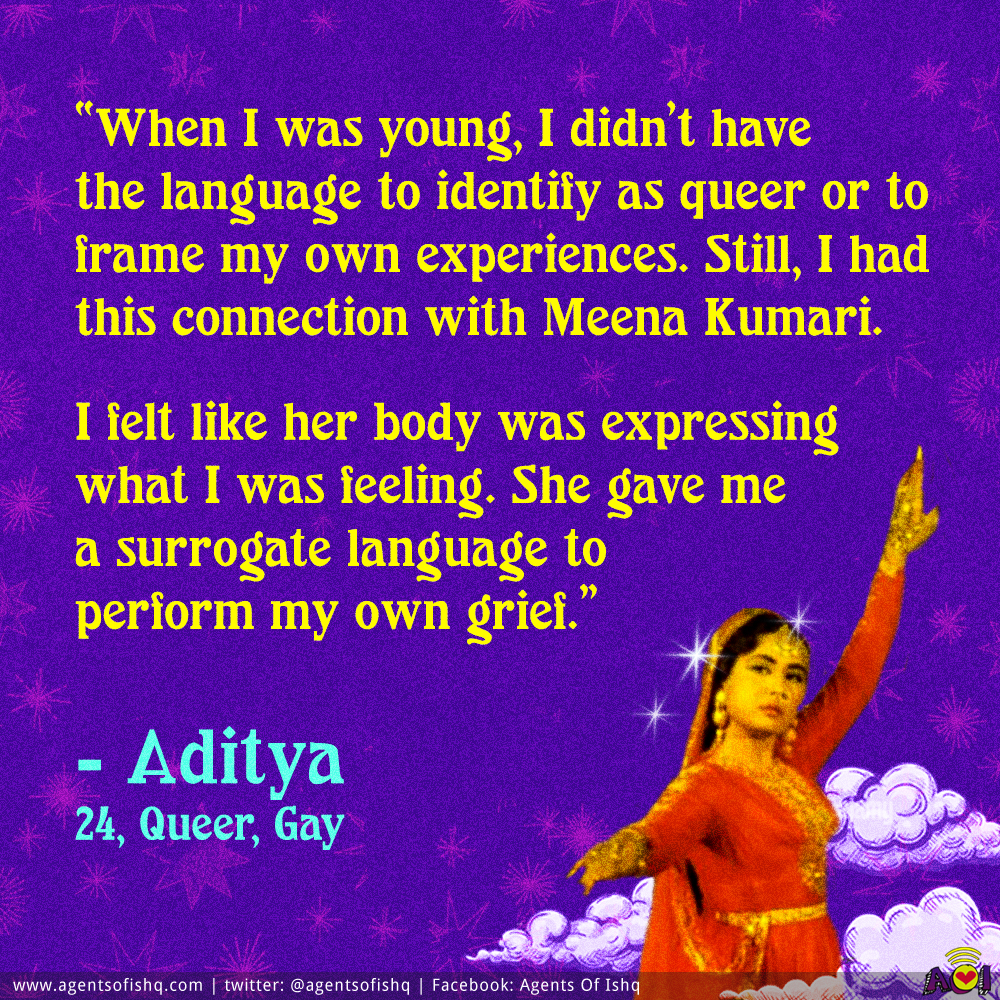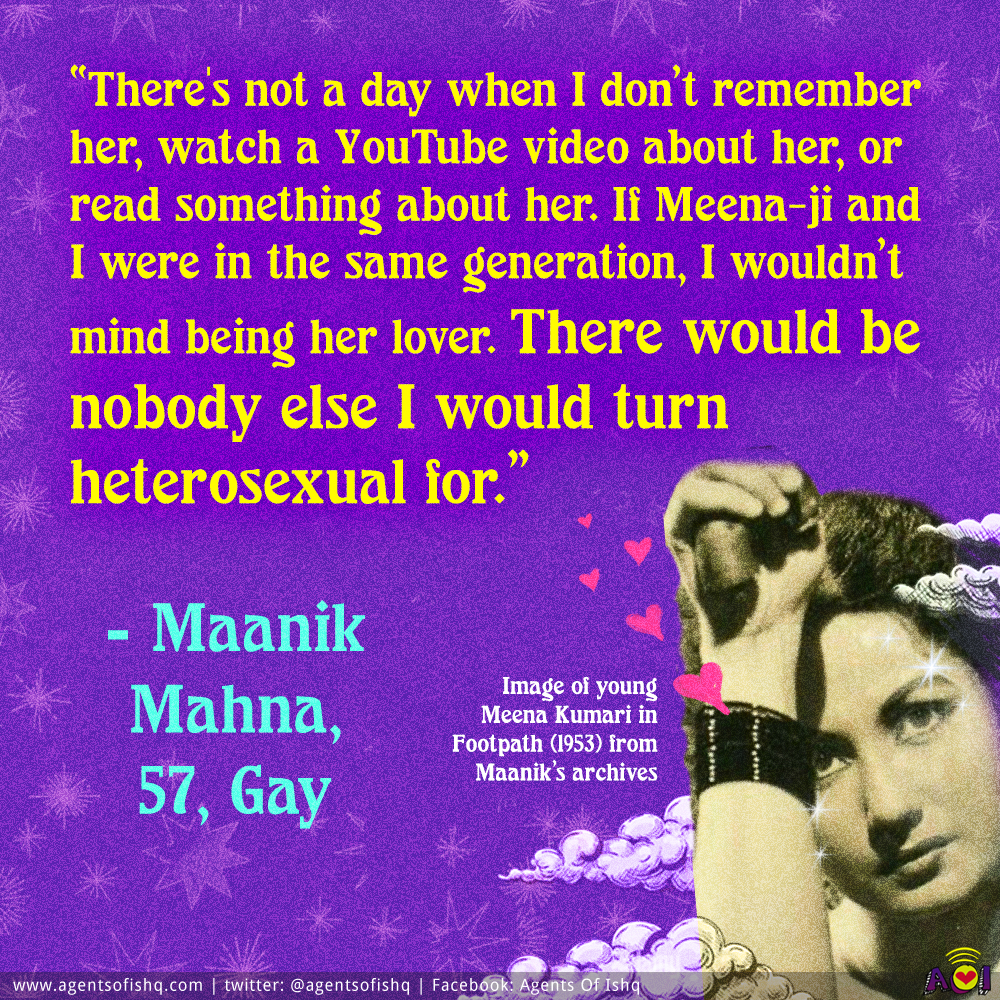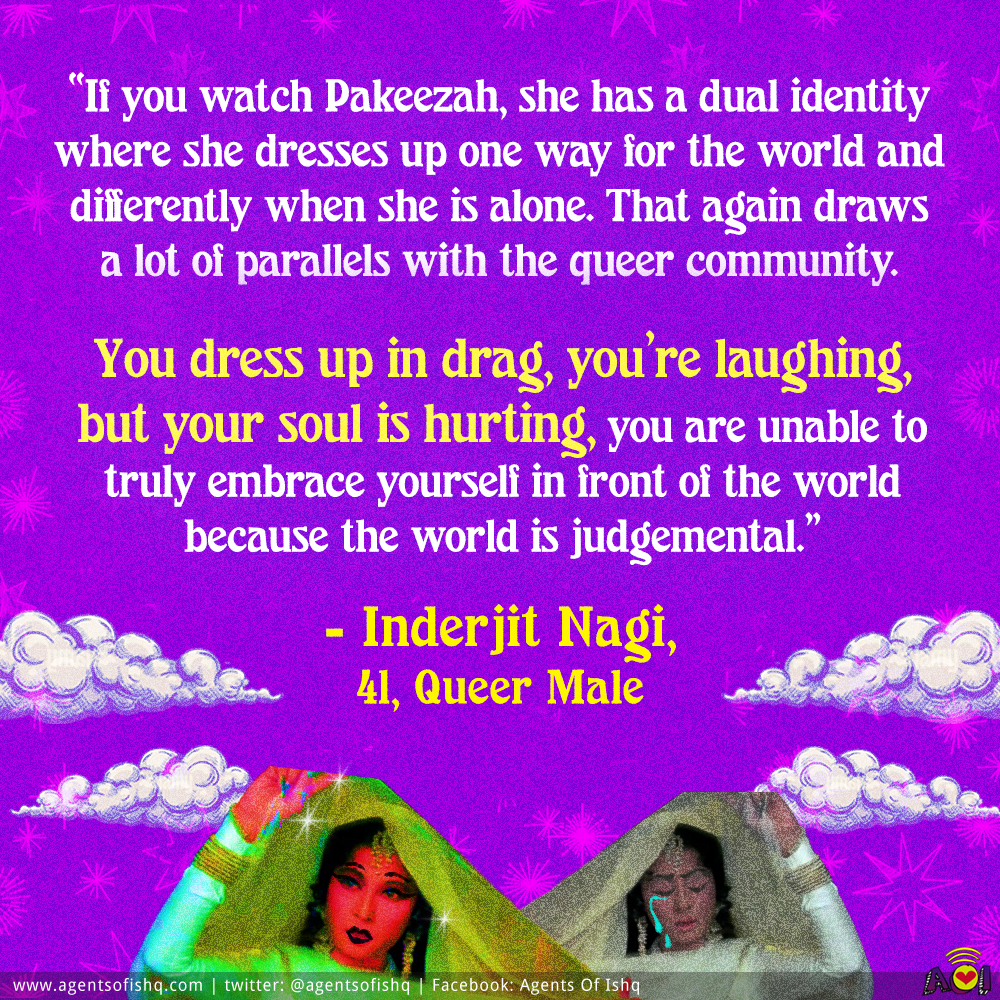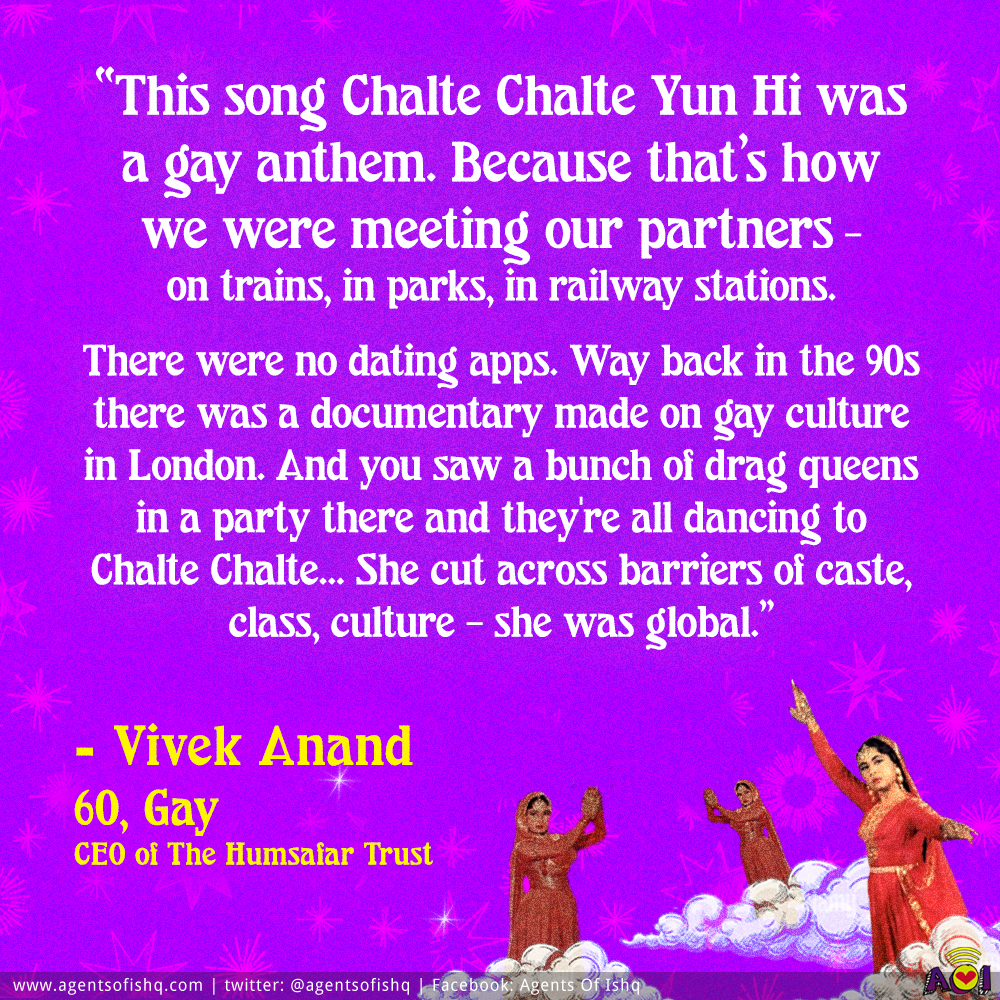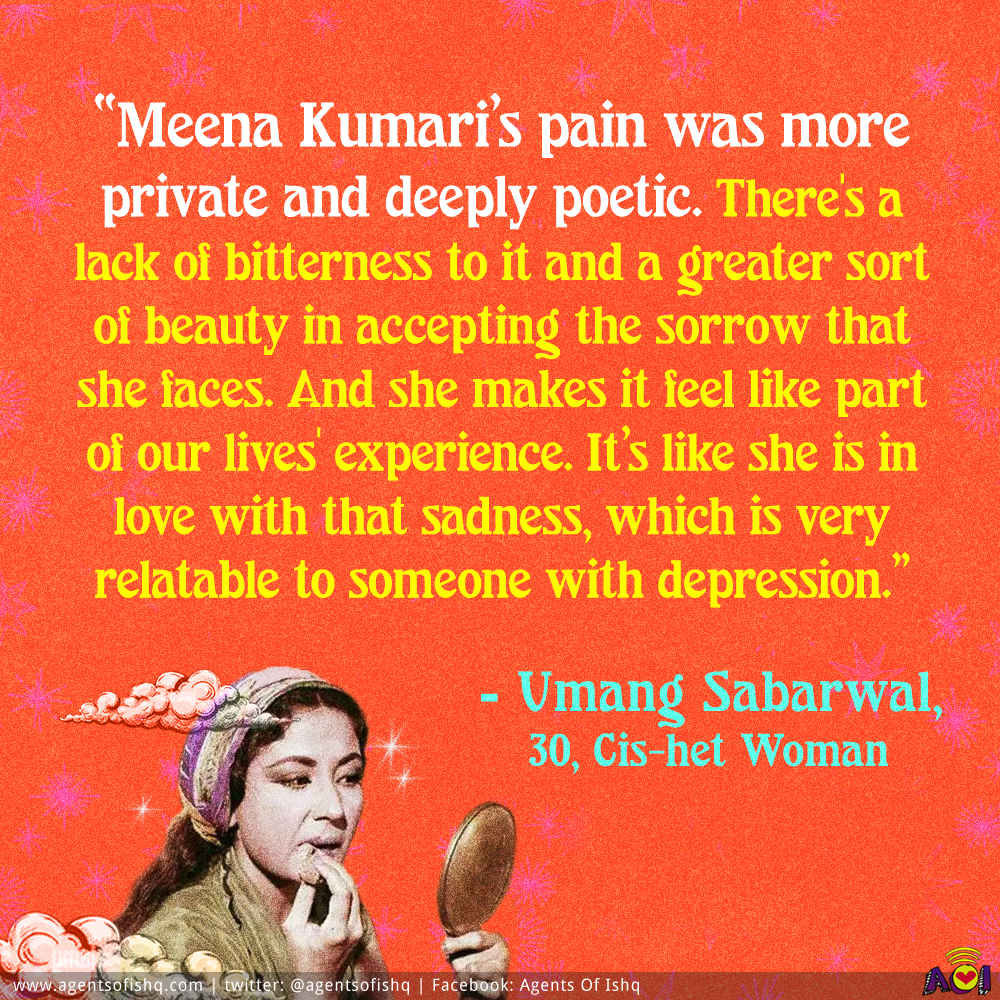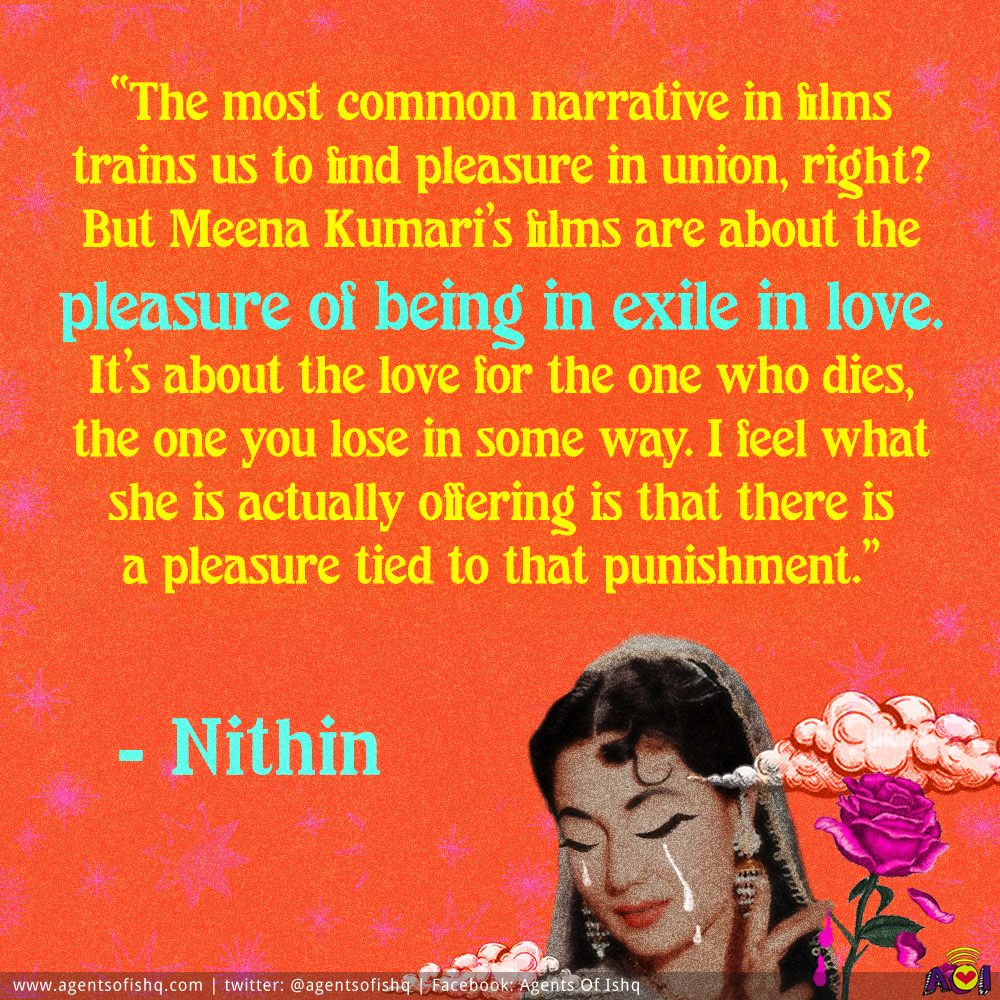Cinema icons have an effect on our lives and cultures far beyond their screen presence. What truly makes them ‘icons’ and not just ‘stars’ is how they somehow forge an intimate relationship with us. They bring alive our fantasies and open a world of possibilities for us. Through them, we find a language for our many emotions and experiences - dreams, love, friendship, heartbreak, conflict, queerness, and expression of our most private selves.
One such icon from the legacy of Hindi cinema is Meena Kumari whose birthday falls on August 1.
She continues to be remembered for her iconic performances, songs, and her poetry. Her poignant portrayal of loneliness, desire, and melancholia in films like Sahib, Bibi aur Ghulam (1962) and Pakeezah (1972) earned her the title of ‘Tragedy Queen’
In a song from Benazir (1964), she sings,
Hum mein apna ilaaj-e-dard-e-dil karna bhi aata hai ...
hum aaise jeene waale hai jinhe marna bhi aata hai
(I know how to heal my broken heart,
I live knowing how to die as well)
It was said that her life was not very different from her on-screen persona.
She also became a queer icon between the 60s-80s. Her songs, films, and even her poetry offered many queer people a language to express their love, desire and pain that was often rejected by the world.
We asked some people what Meena Kumari meant to them. Here’s what they told us:
Aditya, 24, Queer, Gay
I think tragedy is an overarching theme in Meena Kumari’s public image – her films and her personal life. For me, I was most drawn to how she performed this tragedy.
When I was young, I didn’t have the language to identify as queer or to frame my own experiences. Still, I had this connection with Meena Kumari. I felt like her body was expressing what I was feeling. She gave me, like, a surrogate language to perform my own grief.
As I grew older and discovered her poetry, I felt I was discovering Meena Kumari as a person, beyond an actress on screen. That’s when I realised, wow that’s why she’s so good [on screen]. That feeling on screen came from her whole persona.
There is an amazing song which she has sung and written called Chaand Tanha. I’m obsessed with it! It’s about loneliness. Not just of one person but of other people too, of couples who may be together but still feel lonely. It’s like a collection of all the loneliness in the world. So huge and grand!
Chand Tanha - https://www.youtube.com/watch?v=z_L8eFA5a6c
Just like how you look, how you sit and how you lie down, how you grieve is also a language. Letting out grief doesn’t mean you can’t give it a form. By giving your vulnerability a form, you’re honouring it. It’s not disrespectful or fake. Someone like Meena Kumari helps you open up a little more and think about your emotions or vulnerability differently.
Maanik Mahna, 57, Gay
I was six and a half years old on March 31st, 1972 when she passed away. I still remember that day’s front-page article in the Hindustan Times. It said “Meena Kumari Dead” and there was a picture of her from Pakeezah running away from the nikah (marriage) that Raj Kumar had proposed to her. There was a connection I felt instantly. I’m almost 57 now but I still remember it. I wonder, sometimes, is it like a past life connection?
If Meena-ji and I were in the same generation, I wouldn’t mind being her lover. There would be nobody else I would turn heterosexual for.
At 14, when I listened to a record of Meena-ji’s poetry “I write, I recite”, I was completely mesmerised by her voice. It was also the beginning of my tryst with Urdu shayari. I would attribute my poetic sensibilities to her.
If you look at Pakeezah, the film is, of course, pure poetry. But it’s also the tale of a woman who desperately wants to love and be loved, and cannot achieve it because she’s a tawaif (courtesan). Her personal life was also an eternal quest of finding love and fulfilment. I think a lot of gay men identify with the tragedy of that. It’s said she wanted it to be engraved on her grave that she ended life with a broken song with a broken heart, but not a single regret.
I don’t really have a favourite memory of Meena-ji. I think she lives with me. My partner who lives with me sometimes says he feels a presence in the room all the time. And I say, yeah it very well could be Meena-ji. There's not a day when I don’t remember her, watch a YouTube video about her, or read something about her.
Even with the film I’m making on her life, I just want to thank her because I feel that her spirit, her rooh, is making this possible. On June 3rd, 2022, I finally got an appointment with her niece and elder sister in Amristar. Even with her sister I feel like I am surrounded by connections of a lifetime.
Inderjit Negi, 41, Queer Male
I saw her first in the film called Chitralekha on DD National. It’s a period film where she plays the role of the prostitute, a sex worker. And, opposite her is Ashok Kumar, who is a sadhu, a rishi, a saint, somebody who has renounced the world. The film has the song Sansaar se bhaage phirte ho. It’s about accepting yourself, your queerness, your body, its needs and its hunger. Hunger for food and hunger for other physical needs. I am not really a die-hard Meena Kumari fan, but these multiple layers in her songs are why I feel connected to her.
Sansaar Se Bhaage…: https://www.youtube.com/watch?v=17kq4TkpeUE
She got some of the most tragic and poignant lyrics. There’s another song Hum tere pyaar mein sara aalam kho baithe hai. She says that I have completely lost myself, because I am so devotedly in love with you. She says love is like a cage and that you put me in it, but I have started loving being in this cage because it is with you. It’s very much like that teenage love when you’re unable to express it because you’re already dealing with your sexuality and all that. That’s the relatedness, I feel.
Hum tere pyaar mein: https://www.youtube.com/watch?v=onb3sBz3xV4
If you watch Pakeezah, she has a dual identity where she dresses up one way for the world and differently when she is alone. That again draws a lot of parallels with the queer community. You dress up in drag, you’re laughing, you’re entertaining, but your soul is hurting, you are unable to truly embrace yourself in front of the world because the world is judgemental. For queer people, the only way to express yourself was mostly by depending on films, film songs and film characters. The relatability with her tragedy, the films where she united with a lover – what she truly sort of gave the queer community was hope.
Vivek Anand, 60, Gay, CEO of The Humsafar Trust
In Sahib, Bibi aur Ghulam, her introduction scene is pretty late. When Guru Dutt first sees her, he starts at her feet and slowly the camera moves upwards and there’s a long shot of her – regal, royal, draped in a sari. And that expression on Guru Dutt’s face is probably the same as the millions of people who watched this scene and went “Wow! Who is this woman?” This was my introduction to Meena Kumari too.
In that film and in Pakeezah, she plays women who are yearning for love and respect. That, I feel, resonated strongly with us as gay men. But on the other side, she’s also flamboyant, very high-camp. Just look at her costumes in Pakeezah! She displays her best self. She was not a size 0, or a sex symbol in your so-called "defined parameters", but just look at her!
Her roles were not of a queer icon, she became one. She was an icon to queer people through the 60s, 70s and 80s. I just look at her and say, "If she can, so can I".
This song Chalte Chalte Yun Hi… from Pakeezah was a gay anthem. Because that’s how we were meeting our partners – on trains, in parks, in railway stations. There were no dating apps. Way back in the 90s there was a documentary made on gay culture in London. And you saw a bunch of drag queens in a party there and they're all dancing to Chalte Chalte… She cut across barriers of caste, class, culture – she was global.
I just want to tell her: “It's been 50 years since you passed away but there's not a single day that I don't miss you. You have been a part of my existence, my life.”
Chalte Chalte: https://www.youtube.com/watch?v=fH73z7rVDqs
Umang Sabarwal, 30, Cis-het Woman
I've not seen Meena Kumari’s whole body of work to interpret her persona, so it was always this suna-kaha, hearsay version of her as ‘the tragedy queen’ not just in terms of her roles but also what I heard about and read of her life. I found that very endearing. I felt like she was a cultural icon of sadness.
But just a few years ago, I read excerpts of her poem on Agents Of Ishq and then my Spotify shuffle landed me on recordings of her poetry. I began listening to these recordings – of the ghazals she had written, in her own voice, and that was the moment I fell in love with her. It was the poetry, her voice and just the sadness in it.
There's a line in this Meena kumari poem called Chand Tanha Hai. She says Humsafar koi mile bhi toh kya, dono chalte rahe yahaan tanha (So what if there is a companion, they walk alone together). Unlike the popular version of sadness, a Guru Dutt kind of sadness, which was about relinquishing the world, her pain was more private and deeply poetic. This line is so beautiful. There's a lack of bitterness to it and a greater sort of beauty in accepting the sorrow that she faces. And she makes it feel like part of our lives' experience. I think she's special for different people for different reasons but this is my connection to her.
I just want to tell her you are beautiful and maybe go easy on the drinks this time! “Write more” is also something I would tell her.
Nithin
The most common narrative in films trains us to find pleasure in union, right? But with Meena Kumari, her films are about the pleasure of being in exile in love. It’s about the love for the one who dies, the one you lose in some way.
Feminist responses – especially second wave feminist responses – to films usually talk about why women who don’t conform to society’s rules are punished. But, in an article I wrote about Meena Kumari, I suggest that as one of those women, she is actually offering that there is a pleasure tied to that punishment.
If you look at Hindi songs around her time itself, they worked a lot with that emotion or bhaava. It followed a tradition of ghazals which were about separation and pining and yearning. I think it’s also her training, a creative force, almost. She performed songs that had that bhaava and, as a poet, wrote ghazals in turn with that bhaava also. So, this melancholia was really something she had internalised.


